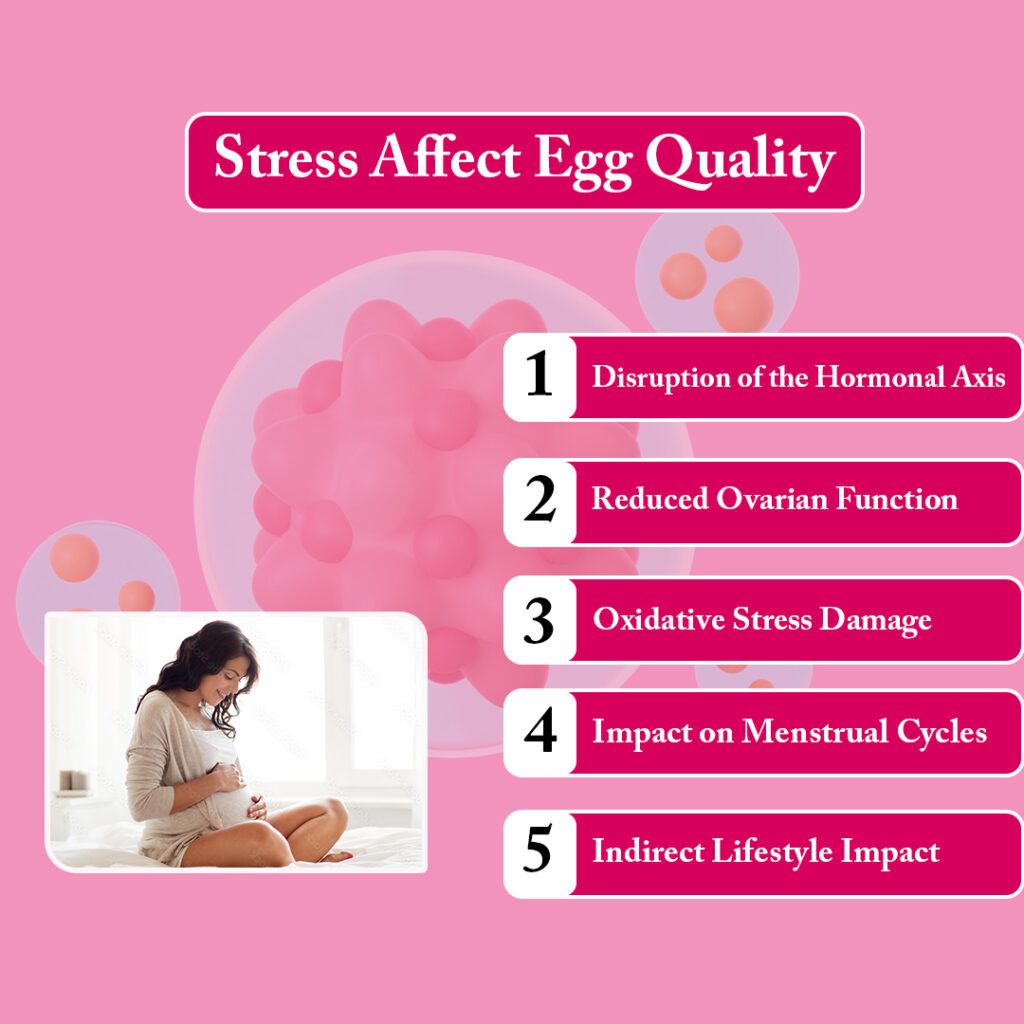Fertility is a delicate balance of hormones, lifestyle, and emotional well-being. While occasional stress is normal, prolonged or chronic stress can interfere with reproductive health — particularly by influencing egg quality. Understanding this connection is important for anyone trying to conceive naturally or through fertility treatments like IVF.
🔬 The Science Behind Stress and Egg Quality
Stress triggers a chain reaction in the body, starting with the hypothalamus (the brain’s control center for hormone regulation). Here’s what happens when stress becomes long-term:
✅ 1. Disruption of the Hormonal Axis
The hypothalamic-pituitary-ovarian (HPO) axis controls ovulation. When stress hormones like cortisol flood the system, they can block the release of reproductive hormones (FSH and LH) needed for egg development.
✅ 2. Reduced Ovarian Function
Research shows that high stress levels may reduce ovarian reserve markers, like AMH (Anti-Müllerian Hormone), which reflects the number and quality of eggs.
✅ 3. Oxidative Stress Damage
Chronic emotional stress increases oxidative stress—an imbalance of free radicals and antioxidants. This can harm egg cells (oocytes), affecting their DNA and reducing their fertilization potential.
✅ 4. Impact on Menstrual Cycles
Irregular or absent periods (amenorrhea) often occur when stress affects the brain-ovary connection. Fewer healthy ovulatory cycles mean fewer chances for high-quality eggs to mature.
✅ 5. Indirect Lifestyle Impact
Stress often causes sleep issues, poor diet choices, lack of exercise, and emotional burnout—all of which add strain on reproductive health and lower egg quality over time.

🌿 How to Manage Stress and Protect Egg Health
You can’t eliminate all stress from your life — but you can manage it in ways that support your fertility and overall well-being.
✅ 1. Adopt Mind-Body Practices
- Meditation, yoga, tai chi, or breathing exercises help calm the nervous system and balance cortisol levels.
- Studies show women practicing mindfulness techniques report better emotional resilience during fertility treatments.
✅ 2. Make Sleep a Priority
- Lack of sleep increases cortisol and disrupts hormonal rhythms.
- Aim for 7–9 hours of deep, restful sleep each night by creating a relaxing bedtime routine (no screens an hour before bed, dim lights, herbal tea).
✅ 3. Move Your Body – But Don’t Overdo It
- Gentle to moderate exercise (walking, swimming, pilates) improves circulation to the ovaries and lowers stress hormones.
- Over-exercising, however, can increase stress and disrupt ovulation — balance is key.
✅ 4. Fuel Your Body with Fertility-Friendly Foods
- Focus on antioxidant-rich foods like blueberries, spinach, nuts, avocados, and whole grains.
- Avoid excessive processed foods, caffeine, and alcohol — they can add stress to the body and harm reproductive health.
✅ 5. Create Emotional Support Systems
- Talk to a therapist, join a fertility support group, or share your feelings with friends and family.
- Emotional support helps you release built-up tension and feel less isolated in your journey.
✅ 6. Practice a Digital Detox
- Limit exposure to stressful fertility forums or social media comparisons.
- Replace screen time with journaling, reading, or calming hobbies.
✅ 7. Incorporate Joyful Activities Daily
- Activities like music, painting, gardening, or even short trips into nature reduce anxiety and bring balance.
- Joy triggers “happy hormones” like serotonin and dopamine, counteracting stress effects.
✅ 8. Consider Professional Help if Needed
- If stress feels overwhelming, consider counseling, therapy, or fertility coaching.
- Stress management isn’t a weakness — it’s a powerful step toward better health and improved fertility outcomes.
🌈 Final Thoughts
Stress is an inevitable part of modern life, but it doesn’t have to control your fertility journey. By learning to manage stress effectively through mindful practices, healthy habits, and emotional support, you create a nurturing environment for your body — and for your eggs.








